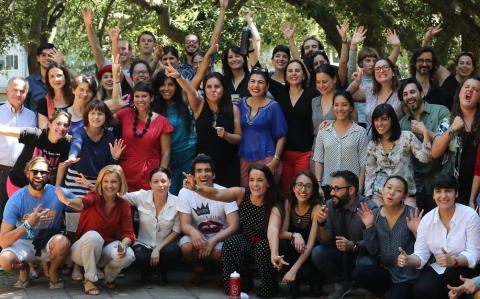
Female journalists from 10 Latin American countries attended the Chicas Poderosas Summit.
Invited and inspired by Mariana Moura Santos, founder of Chicas Poderosas, 35 women journalists and developers from Latin America met for nearly four days at Stanford U for a cornucopia of sessions on technology, innovation and, most of all, teamwork.
The venue, the Bechtel International Center at Stanford, was the ideal spot for the Chicas from 10 countries across the continent to learn about new tools for news media and new ways to think about journalism, technology and design. They also gained leadership skills to help them build Chicas Poderosas chapters in their cities.
The ultimate goal of the Summit and of Santos’ Chicas Poderosas movement is to help women take the lead in newsroom technology and design as a way to bring women's voices into both newsrooms and the content newsrooms generate.
We spent most of our time in the Bechtel Center’s auditorium, with the doors leading to the outdoor patio and park flung open to let in the surprisingly sultry Palo Alto air. Our breaks from sessions on improvisation and design, the future of technology in news, investigative journalism techniques, innovative radio programming, vertical video and drone journalism were at picnic tables and on the lawn.
It was mainly in the open air that the Chicas leaders-to-be took up the challenge laid down by Alvaro Serrano of the United Nations Population Fund to create narratives and interactive projects focusing on teen pregnancy, a global problem that is especially serious in Latin America.
At that park, we also strategized on creating Chicas chapters across the region. The Chicas formed groups, mostly by country, to work out their chapter-building ideas after the summit. They are reporting back as soon as their ideas gel.
The event kicked off – outside, of course – with the group standing barefoot in a nearby grassy area. Austin Meyer and Erik Olesund of Collective Capital led a session on improvisation and design to open our minds, encourage spontaneity and build teams.
We visited the nearby d-School at Stanford to learn how to inspire innovation and break down barriers to creativity and productivity. We also spent a morning at Singularity University and an afternoon with the News Lab@Google team to learn about technological advances and new tools for journalists and news media.
We were especially privileged to be joined by 12 John S. Knight Fellows from Stanford (Mariana was a 2014-2015 JSK Fellow); they served as mentors and presented their JSK Fellowship projects. The group was warmly welcomed by JSK Fellowships Deputy Director Dawn Garcia. JSK Fellowship Director Jim Bettinger also stopped by to address and meet the Chicas.
Now this is a powerful group of @poderosaschicas here at @google! #journalism #media pic.twitter.com/273dmFZfNu
— Stacie Chan (@staciechan) June 10, 2015
We were grateful to have the support of United Airlines, which provided flights for most of the Chicas from Latin America. United’s Macky Osorio and Lilliana Gonzalez participated in the Summit, as did the Open Society Foundation’s Chloe Harman. The Summit would not have been possible without OSF’s generous support. We were also thankful to Alvaro Serrano and UNFPA for covering the cost to bring three Chicas from Latin America.
As always, Mariana Santos – the genius behind Chicas Poderosas – summed up this awesome event best: “Dreams can come true if we dare to dream big enough. Our sponsors and friends helped make this dream – the Summit – come true for Chicas Poderosas. Their contributions are helping to reshape the news media landscape in Latin America. Stay tuned; we will report back very soon with the results!”
You can read and see more about the summit and our sponsors on the Chicas Poderosas website.